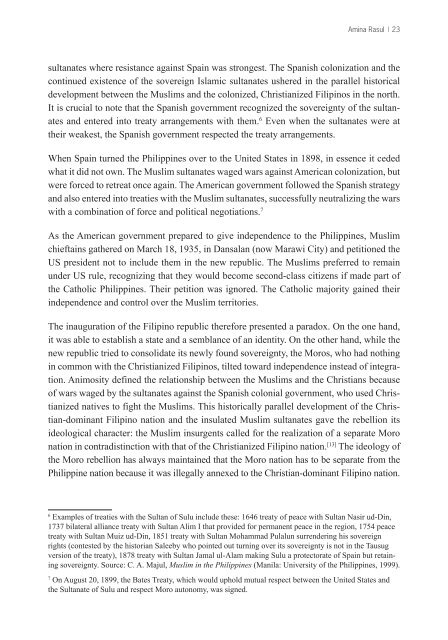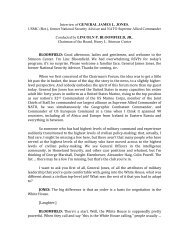Islam and Politics - The Stimson Center
Islam and Politics - The Stimson Center
Islam and Politics - The Stimson Center
Create successful ePaper yourself
Turn your PDF publications into a flip-book with our unique Google optimized e-Paper software.
Amina Rasul | 23<br />
sultanates where resistance against Spain was strongest. <strong>The</strong> Spanish colonization <strong>and</strong> the<br />
continued existence of the sovereign <strong>Islam</strong>ic sultanates ushered in the parallel historical<br />
development between the Muslims <strong>and</strong> the colonized, Christianized Filipinos in the north.<br />
It is crucial to note that the Spanish government recognized the sovereignty of the sultanates<br />
<strong>and</strong> entered into treaty arrangements with them. 6 Even when the sultanates were at<br />
their weakest, the Spanish government respected the treaty arrangements.<br />
When Spain turned the Philippines over to the United States in 1898, in essence it ceded<br />
what it did not own. <strong>The</strong> Muslim sultanates waged wars against American colonization, but<br />
were forced to retreat once again. <strong>The</strong> American government followed the Spanish strategy<br />
<strong>and</strong> also entered into treaties with the Muslim sultanates, successfully neutralizing the wars<br />
with a combination of force <strong>and</strong> political negotiations. 7<br />
As the American government prepared to give independence to the Philippines, Muslim<br />
chieftains gathered on March 18, 1935, in Dansalan (now Marawi City) <strong>and</strong> petitioned the<br />
US president not to include them in the new republic. <strong>The</strong> Muslims preferred to remain<br />
under US rule, recognizing that they would become second-class citizens if made part of<br />
the Catholic Philippines. <strong>The</strong>ir petition was ignored. <strong>The</strong> Catholic majority gained their<br />
independence <strong>and</strong> control over the Muslim territories.<br />
<strong>The</strong> inauguration of the Filipino republic therefore presented a paradox. On the one h<strong>and</strong>,<br />
it was able to establish a state <strong>and</strong> a semblance of an identity. On the other h<strong>and</strong>, while the<br />
new republic tried to consolidate its newly found sovereignty, the Moros, who had nothing<br />
in common with the Christianized Filipinos, tilted toward independence instead of integration.<br />
Animosity defined the relationship between the Muslims <strong>and</strong> the Christians because<br />
of wars waged by the sultanates against the Spanish colonial government, who used Christianized<br />
natives to fight the Muslims. This historically parallel development of the Christian-dominant<br />
Filipino nation <strong>and</strong> the insulated Muslim sultanates gave the rebellion its<br />
ideological character: the Muslim insurgents called for the realization of a separate Moro<br />
nation in contradistinction with that of the Christianized Filipino nation. [13] <strong>The</strong> ideology of<br />
the Moro rebellion has always maintained that the Moro nation has to be separate from the<br />
Philippine nation because it was illegally annexed to the Christian-dominant Filipino nation.<br />
6<br />
Examples of treaties with the Sultan of Sulu include these: 1646 treaty of peace with Sultan Nasir ud-Din,<br />
1737 bilateral alliance treaty with Sultan Alim I that provided for permanent peace in the region, 1754 peace<br />
treaty with Sultan Muiz ud-Din, 1851 treaty with Sultan Mohammad Pulalun surrendering his sovereign<br />
rights (contested by the historian Saleeby who pointed out turning over its sovereignty is not in the Tausug<br />
version of the treaty), 1878 treaty with Sultan Jamal ul-Alam making Sulu a protectorate of Spain but retaining<br />
sovereignty. Source: C. A. Majul, Muslim in the Philippines (Manila: University of the Philippines, 1999).<br />
7<br />
On August 20, 1899, the Bates Treaty, which would uphold mutual respect between the United States <strong>and</strong><br />
the Sultanate of Sulu <strong>and</strong> respect Moro autonomy, was signed.

















